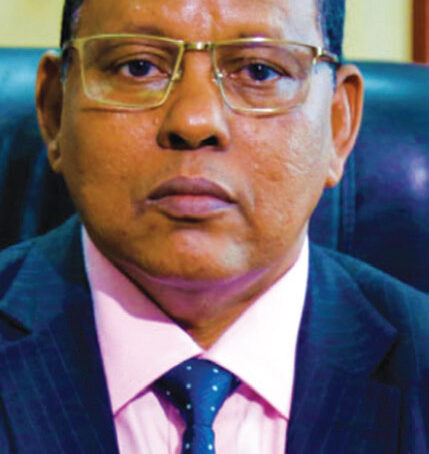Politics
Scandal-Hit WRA Boss Mohammed Shurie Plots Comeback as Garissa Governor

Garissa County is staring at a political bombshell as embattled former Water Resources Authority (WRA) chief executive Mohammed Shurie throws his hat into the gubernatorial ring—despite a trail of scandal, unanswered questions, and whispers of grand corruption that defined his time in public service.
Shurie, who announced his bid with a promise to make Garissa “a Silicon Valley of service delivery,” is no stranger to controversy.
His tenure at both the Garissa Water Services Board and later at WRA was marred by allegations of corruption, nepotism, abuse of office, and manipulation of public contracts—allegations that, though never prosecuted, continue to haunt his reputation.
Insiders at WRA recall a regime where Shurie ruled with an iron fist, turning the agency into what some have called a “private empire.”
Procurement processes were allegedly weaponized to benefit close associates and shell companies linked to allies from his clan. Multiple internal audits—some buried quietly—flagged irregular spending, dubious contractor payments, and ghost water projects particularly in Northern Kenya.
A senior water engineer who served under Shurie at the Garissa Water Services Board spoke on condition of anonymity:
“There were entire projects budgeted for and ‘completed’ on paper, yet not a single borehole existed on the ground. Millions evaporated, just like the water we were supposed to deliver.”
Despite repeated warnings from the Auditor-General’s office, no significant reforms were enacted under Shurie’s leadership. Instead, whistleblowers were reportedly intimidated, transferred, or silenced altogether.
Shurie’s sudden political ambition, according to observers, is less about serving the public and more about leveraging his Ogaden clan’s numbers to whitewash his tainted record.
His entry into the race has sent shockwaves across Garissa’s political class, with rivals accusing him of attempting to “launder his past through the ballot box.”
“The panic isn’t because he’s popular,” said one local politician. “It’s because he’s dangerous—politically connected, financially loaded from questionable deals, and unafraid to bulldoze his way to power.”
Investigations by this reporter reveal that between 2017 and 2022, Shurie’s WRA presided over projects worth more than KSh 8 billion—many of which remain unaccounted for.
An EU-funded water rehabilitation program in North Eastern Kenya was flagged for irregular tender awards, with some contracts going to companies reportedly owned by Shurie’s relatives.
Yet no arrests were ever made. Sources in the EACC say inquiries into his dealings were quietly dropped due to “political pressure from above.”
Now, with no formal charges against him, Shurie is repackaging himself as a development-focused “technocrat”—a dangerous narrative, critics argue, given his past.
“Garissa does not need another looter-in-chief. It needs healing, clean leadership, and service—not PR and Silicon Valley fantasies,” said a civil society leader based in Garissa town.
Despite the criticism, Shurie’s campaign machinery is already in motion, oiled by vast funds and influential backers—some believed to have benefited from past water deals.
As Garissa approaches the 2027 election, voters face a chilling question: will they fall for flashy promises and clan calculations, or demand accountability for a man whose hands, many believe, are soaked in scandal?
The ghosts of Kenya’s failed water sector may yet find new life in Garissa’s County Hall.
The question is—will the people let it happen?
Kenya Insights allows guest blogging, if you want to be published on Kenya’s most authoritative and accurate blog, have an expose, news TIPS, story angles, human interest stories, drop us an email on [email protected] or via Telegram
-

 News1 week ago
News1 week agoTHE FIRM IN THE DOCK: How Kaplan and Stratton Became the Most Scrutinised Law Firm in Kenya
-

 Investigations2 weeks ago
Investigations2 weeks agoMulti-Million Dollar Fraud: Three Kenyans Face US Extradition in Massive Cybercrime Conspiracy
-

 Economy1 week ago
Economy1 week agoIran Demands Arrest, Prosecution Of Kenya’s Cup of Joe Director Director Over Sh2.6 Billion Tea Fraud
-

 Business2 weeks ago
Business2 weeks agoA Farm in Kenya’s Rift Valley Ignites a National Reckoning With Israeli Investment
-

 Africa2 weeks ago
Africa2 weeks agoFBI Investigates Congresswoman Ilhan Omar’s Husband’s Sh3.8 Billion Businesses in Kenya, Somalia and Dubai
-

 Grapevine6 days ago
Grapevine6 days agoA UN Director Based in Nairobi Was Deep in an Intimate Friendship With Epstein — He Even Sent Her a Sex Toy
-

 News2 weeks ago
News2 weeks agoTragedy As City Hall Hands Corrupt Ghanaian Firm Multimillion Garbage Collection Tender
-

 Arts & Culture2 weeks ago
Arts & Culture2 weeks agoWhen Lent and Ramadan Meet: Christians and Muslims Start Their Fasting Season Together

















